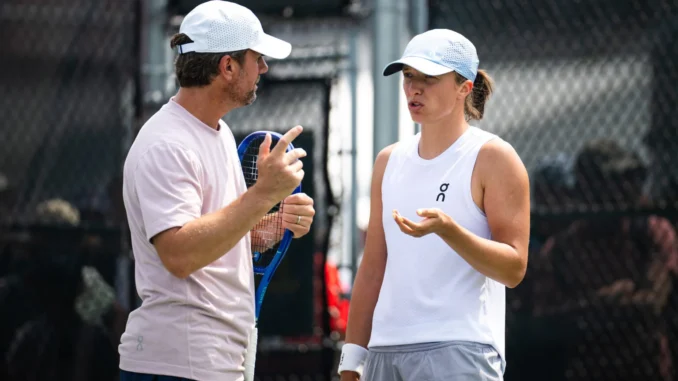
As the tennis world converges on Montreal for the 2025 Canadian Open, Iga Swiatek, the world No. 3 and four-time French Open champion, is standing firmly by her coach, Wim Fissette, in the face of intense scrutiny. The Polish star, who has been navigating a turbulent year marked by a doping controversy and a dip in form, used a pre-tournament press conference to address critics of her coaching team, particularly those targeting Fissette. Her impassioned defense not only underscores her trust in the Belgian coach but also sheds light on the biggest challenge they’ve faced since beginning their partnership in October 2024: adapting her game to faster surfaces like the hard courts of Montreal.
Swiatek’s 2025 season has been a rollercoaster. After a dominant 2024 French Open title, her fourth at Roland Garros, she faced a one-month suspension in November 2024 for a positive test for trimetazidine, a banned substance later attributed to contaminated melatonin. The ordeal, which she described as “the most difficult experience of my career,” sidelined her from the Asian swing and saw her ranking slip to No. 8, the lowest since March 2022. Her decision to part ways with longtime coach Tomasz Wiktorowski and hire Fissette, a veteran who guided Kim Clijsters, Angelique Kerber, and Naomi Osaka to Grand Slam glory, was met with skepticism, especially in Polish media. Critics questioned whether Fissette could help Swiatek reclaim her dominance, particularly on surfaces outside her clay-court comfort zone.[](https://www.tennis365.com/tennis-news/iga-swiatek-responds-harsh-unfair-statement-coach-wim-fissette)[](https://www.essentiallysports.com/wta-tennis-news-iga-swiatek-finally-in-great-place-as-coach-wim-fisette-breaks-the-deadlock-on-her-mental-health-amidst-doping-scandal/)
In Montreal, Swiatek didn’t mince words when addressing the criticism. “No, this is a very harsh and unfair statement,” she said, responding to suggestions that Fissette was responsible for her recent struggles. “I can only look at the coach from my own perspective, which is the only right one for me, that is, what our work looks like every day.” She emphasized the complexity of her challenges, noting that her “worse results coincided with many other challenges in recent months, also in family life.” The death of her grandfather in April 2025 forced her to return to Poland for his funeral, disrupting her clay-court preparations and contributing to a 6-1, 6-1 semifinal loss to Coco Gauff in Madrid. “I found myself at a stage of my career where I had to reformulate my thinking about myself,” she added, highlighting the mental toll of balancing personal and professional pressures.
The biggest hurdle for Swiatek and Fissette has been adapting her game to faster surfaces, a long-standing weakness. While her clay-court dominance—evidenced by a 95% win rate at Roland Garros—has earned her the “Queen of Clay” moniker, her grass and hard-court performances have been inconsistent. Fissette, known for his tactical acumen, has focused on refining her footwork and serve to better handle the pace of these surfaces. “We’re working on my footwork a lot, just movement and being able to get back up from really defensive, tough positions to still win a point,” Swiatek explained. Their efforts paid dividends at Wimbledon 2025, where she won her first title with a stunning 6-0, 6-0 rout of Amanda Anisimova, a victory she attributed to Fissette’s guidance. “I went blindly to what he told me, and it has certainly paid off,” she said of their grass-court preparations.
Despite this triumph, the transition hasn’t been seamless. Swiatek admitted that early in their partnership, “some areas of my game completely stopped working” as she adjusted to Fissette’s methods. His emphasis on returning to her 2022 aggressive style, when she won 37 consecutive matches, required unlearning habits developed under Wiktorowski. “He had to convince me of many things, because it takes me quite a long time to even change the style of the game,” she noted. Fissette’s approach, which she described as “pretty refreshing,” has fostered a positive off-court relationship, with Swiatek appreciating his nonjudgmental support during her doping saga. “I feel like he knows what I feel and he doesn’t judge. He just helps me,” she said, crediting his experience with top WTA players.
As Swiatek prepares for her Canadian Open opener against a qualifier on Wednesday, July 30, 2025, she faces a tough draw, with a potential third-round clash against Jelena Ostapenko, who has beaten her four times. Her 79% first-serve point win rate at Wimbledon, the joint-second highest in the women’s draw, signals progress, but her 16-5 record under Fissette reflects the ongoing growing pains. To her critics, Swiatek’s message is clear: “I hope they will just leave me alone and let me do my job, because obviously you can see that we know what we’re doing, and I have the best people around me.” With Fissette’s guidance and her own resilience, Swiatek is determined to silence doubters and reclaim her place atop the WTA Tour in Montreal and beyond.
Leave a Reply